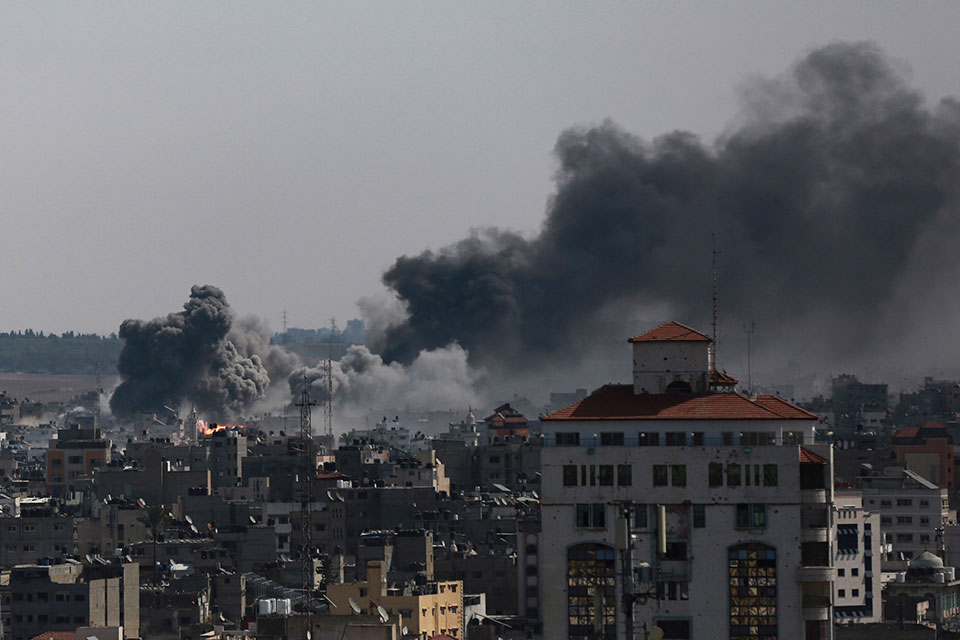Israeli airstrikes devastated parts of Gaza on Thursday, killing at least 75 people and wounding hundreds, according to Gaza’s civil defense agency. The attacks came just hours after a fragile ceasefire agreement was announced by mediators Qatar and the United States, raising fears of further escalation.
The ceasefire, set to begin on Sunday, was aimed at ending months of bloodshed, including the exchange of Israeli hostages for Palestinian prisoners. It also promised steps toward a broader resolution of the conflict. However, Israeli Prime Minister Benjamin Netanyahu’s office accused Hamas of “reneging on parts of the agreement” in what it called an attempt to secure “last-minute concessions.”
Hamas official Sami Abu Zuhri dismissed the claims, saying they had “no basis,” while local residents in Gaza mourned the loss of dozens of lives in the latest strikes, including entire families.
The war, triggered by Hamas’ October 7, 2023, attack on Israel, has been marked by unprecedented suffering in Gaza. Israeli forces have bombarded the densely populated territory for months, killing more than 46,700 people, the vast majority civilians, according to the health ministry in Gaza. Entire neighborhoods have been reduced to rubble, and hundreds of thousands remain displaced, enduring severe shortages of food, water, and medical supplies.
The initial Hamas attack, described as the deadliest in Israeli history, killed 1,210 people and resulted in 251 hostages being taken. Among them, 94 are still held, with Israeli officials claiming 34 of those are dead.
While the ceasefire announcement brought hope to many, the timing of the latest Israeli strikes has overshadowed celebrations. In north Gaza, Saeed Alloush, who lost 40 family members in the strikes, described the night as one of devastation. “We were waiting for the truce and were happy, but this happiness turned to heartbreak,” he said.
In Tel Aviv, reactions were also mixed. While some expressed relief at the possibility of hostages returning, there was grief over those who had died. “This is a bittersweet moment,” said one resident.
Despite international efforts to mediate the deal, divisions within Israel’s ruling coalition have delayed its ratification. Far-right leaders, including Finance Minister Bezalel Smotrich and National Security Minister Itamar Ben Gvir, have openly criticized the agreement, with Smotrich calling it “dangerous” and Ben Gvir labeling it “disastrous.”
The ceasefire deal, announced by Qatar’s Prime Minister Sheikh Mohammed bin Abdulrahman bin Jassim Al-Thani, includes a 42-day initial truce during which hostages would be released, and displaced Palestinians allowed to return to their homes. The deal also calls for the withdrawal of Israeli forces from Gaza’s populated areas and increased humanitarian aid.
US President Joe Biden, who praised the agreement as a significant step toward peace, emphasized the urgent need for humanitarian assistance in Gaza. Egyptian President Abdel Fattah al-Sisi also stressed the importance of reopening the Rafah crossing to deliver aid to the besieged territory.
The UN Palestinian refugee agency (UNRWA) welcomed the ceasefire, urging immediate and unhindered access to Gaza. “The suffering caused by this war is immense,” said UNRWA head Philippe Lazzarini.
Let the Truth be known. If you read VB and like VB, please be a VB Supporter and Help us deliver the Truth to one and all.
Bengaluru (PTI): Karnataka Chief Minister Siddaramaiah and Union Finance Minister Nirmala Sitharaman led the statewide pulse polio vaccination drive on Sunday.
While Siddaramaiah kicked off the campaign along with state Health Minister Dinesh Gundu Rao and Home Minister G Parameshwara at his residence 'Kaveri' here, Sitharaman, who is in Vijayanagara district in the state, holding Chintan Shivir, administered pulse polio drops to children below five years of age in Kamalapura.
"Smt @nsitharaman launched the Polio Immunisation Drive in Kamalapura, Karnataka, reaffirming the Government’s commitment to safeguarding child health and ensuring a polio-free India," a post on her 'X' account said.
The post further said that children under five years of age were administered Oral Polio Vaccine (OPV) drops, "reinforcing the collective effort to protect future generations through timely immunisation."
According to the details shared by the health departments, about 62.4 lakh children have been identified for it.
ALSO READ: Man from Rajasthan arrested for duping devotees visiting Kollur Temple using fake website
"Under the routine immunization programme, every Child is given 5 doses of OPV (Oral Polio Vaccine) and 3 doses of IPV (inactivated injectable polio vaccine) and Government of Karnataka is committed that no child should miss these doses," a government statement said.
Apart from all hospitals in the state, special focus will be given to immunise children living in villages, hilly areas, brick kilns, slums, migrant areas, farmhouses, urban slums. Booths will also be set up in railway stations, metro stations, airports and Seaports, the statement said.
The state health department has set up 33,258 booths and deployed 1,030 mobile teams, 2,096 transit teams, 1,13,115 vaccinators and 7,322 Supervisors.
All children below five years of age will be administered the oral polio vaccine on December 21, 2025.
"Even if your child has received any number of doses of OPV before, it is very essential to immunise your child again during this round," the department said.
In order to allay concerns, the department said the polio vaccine is completely safe and people should not to believe in any false rumours.
Smt @nsitharaman launched the Polio Immunization Drive in Kamalapura, Karnataka, reaffirming the Government’s commitment to safeguarding child health and ensuring a polio-free India.
— Nirmala Sitharaman Office (@nsitharamanoffc) December 21, 2025
On the occasion, children under five years of age were administered Oral Polio Vaccine (OPV)… pic.twitter.com/PN4IJUGtnn
ಗೃಹಕಚೇರಿ ಕೃಷ್ಣಾದಲ್ಲಿ "ರಾಷ್ಟ್ರೀಯ ಲಸಿಕಾ ದಿನ"ವನ್ನು ಮಕ್ಕಳಿಗೆ ಪಲ್ಸ್ ಪೋಲಿಯೊ ಲಸಿಕೆ ಹಾಕುವ ಮೂಲಕ ಉದ್ಘಾಟಿಸಿದೆ.
— Siddaramaiah (@siddaramaiah) December 21, 2025
ಪ್ರತಿಯೊಬ್ಬರೂ ತಮ್ಮ 5 ವರ್ಷದೊಳಗಿನ ಮಕ್ಕಳಿದ ತಪ್ಪದೇ ಪೋಲಿಯೊ ಲಸಿಕೆ ಹಾಕಿಸುವ ಮೂಲಕ "ಪೋಲಿಯೊ ಮುಕ್ತ ಭಾರತ"ದ ನಮ್ಮ ಅಭಿಯಾನಕ್ಕೆ ಬೆಂಬಲವಾಗಿ ನಿಲ್ಲಬೇಕು ಎಂದು ಮನವಿ ಮಾಡುತ್ತೇನೆ.
ಆರೋಗ್ಯ ಸಚಿವರಾದ ದಿನೇಶ್… pic.twitter.com/uClMoqOnyB





